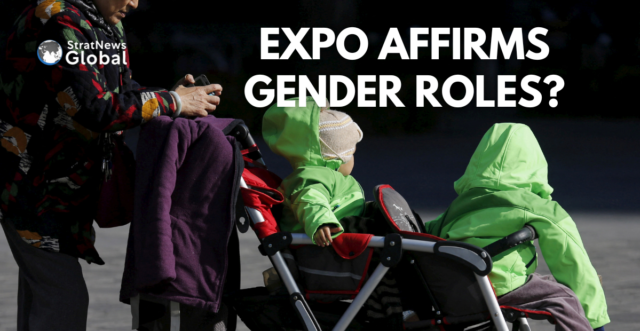A neon pink sign at a marriage expo in Changsha reads, “Having three children is the best.” It stands alongside other messages urging visitors to embrace marriage and family. This marriage-themed festival, intended to encourage weddings and births, highlights China’s efforts to address its shrinking population. However, it has drawn light crowds and significant criticism, particularly on social media, where many have labelled it outdated and dismissive of gender equality.
Gendered Slogans Draw Criticism
The expo’s slogans, including “Housework is the best” and “Best at raising kids,” sparked controversy online. Many commenters criticised these messages for promoting outdated gender roles, with slogans seemingly aimed exclusively at women. On the social media platform Weibo, a user with the handle Jianguo questioned, “Shouldn’t sharing housework be the right thing to do?”
On Xiaohongshu, another social media platform, user Xiaohong expressed disappointment, suggesting the festival might discourage people from marriage rather than encouraging it. This pushback highlights the growing divide between traditional views promoted by authorities and modern perspectives among younger generations.
Declining Marriage And Birth Rates In China
China’s marriage rates have dropped sharply, with the Ministry of Civil Affairs reporting a 16.6% decline in marriage registrations in the first three quarters of 2024, compared to the previous year. In response, Beijing has directed local governments to encourage marriage and childbearing “at the right age.” While these directives include support for maternity and childcare, they lack clear plans for funding and specific details on how they will be implemented.
Experts remain sceptical about the effectiveness of these policies. Xiujian Peng, a senior research fellow at Victoria University, believes the impact of these initiatives will be limited without broader measures to address gender inequality and reduce high work demands. Peng suggests that practical changes, such as reducing working hours and offering genuine support for women in the workplace, could be more effective in encouraging marriage and childbearing.
Economic Barriers and Cultural Shifts
The high cost of living, coupled with a competitive education system and rising housing prices, are also major deterrents to marriage and parenthood in China. Shanghai resident Aiqi, 32, dismissed the latest government measures as insufficient. “The cost of having children is still too high and the benefits too low,” she said, noting that policies alone are unlikely to inspire significant change without broader reforms to make family life more affordable.
Meanwhile, China’s Yuwa Population Research estimates that stabilising the population would require substantial investments, roughly 10% of GDP, an investment many debt-laden local governments cannot currently afford. According to demographer Yi Fuxian from the University of Wisconsin-Madison, these financial limitations hinder meaningful progress in population policies.
Marriage Expo Efforts Miss The Mark
Changsha’s marriage festival introduced initiatives such as a “marriage school,” allowing men to wear pregnancy simulators and try diaper-changing stations. Despite these efforts to make parenting seem accessible, many social media users criticised the expo for its narrow focus and the pressure it places on women to conform to traditional roles. Weibo user Yuxiao expressed frustration, saying, “Treat girls as human beings and respect them… then perhaps more people would consider marriage.”
Ultimately, critics argue that unless policies reflect real concerns, such as economic barriers and gender equality, they are unlikely to have a lasting impact on China’s declining marriage and birth rates.
(with inputs from Reuters)
Research Associate at StratNewsGlobal, A keen observer of #China and Foreign Affairs. Writer, Weibo Trends, Analyst.
Twitter: @resham_sng





